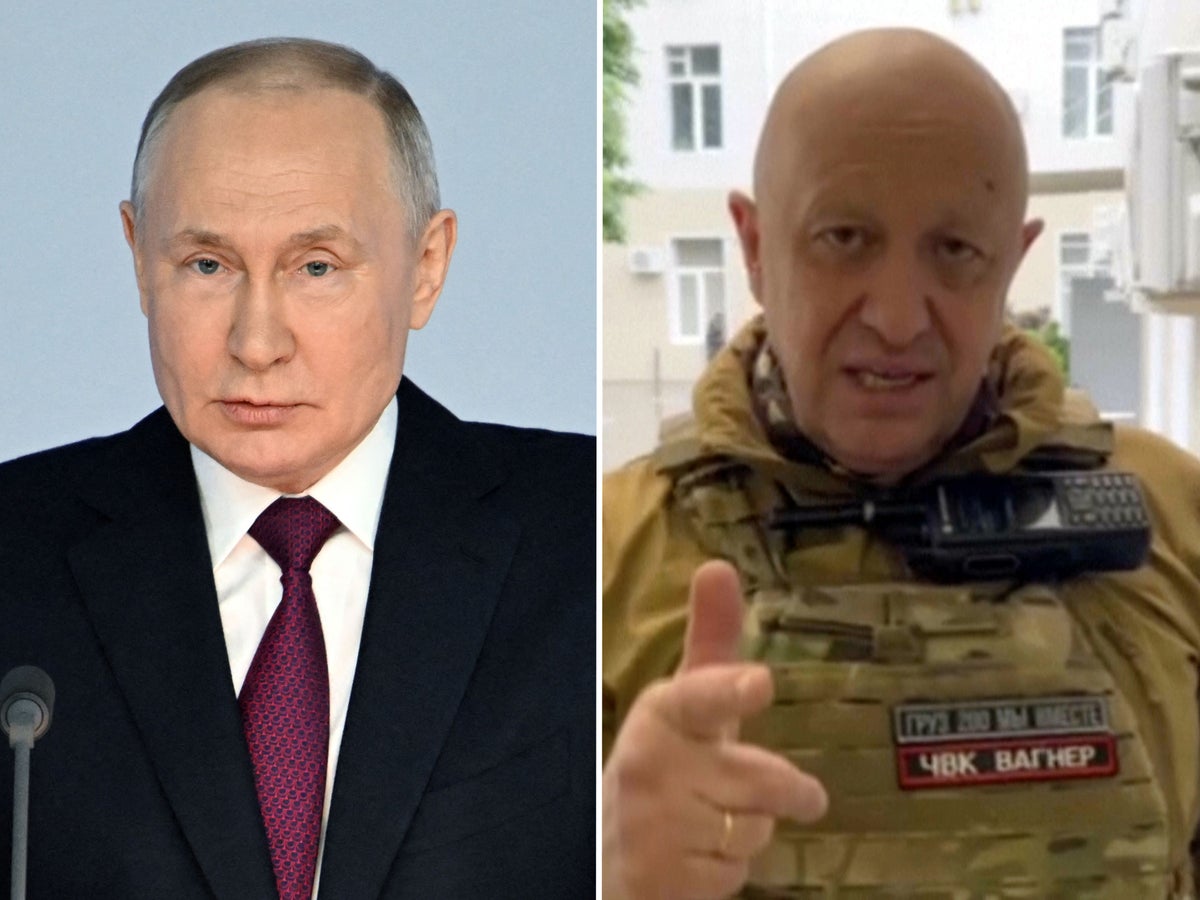
Vladimir Putin met the Wagner mercenary leader Yevgeny Prigozhin days after his fighters marched on Moscow in an aborted mutiny, the Kremlin has said.
Mr Putin declared the armed mutiny to be treasonous as it happening, appearing in an emergency television address to denounce what was the most serious challenge to his two-decade rule of Russia. Yet, according to the Kremlin, the president invited the Wagner chief – and a number of his commanders – to a meeting in Moscow so that Mr Putin could give his “assessment” of both the armed uprising and the mercenary group’s war effort during the invasion of Ukraine.
“The president gave an assessment of the company's actions on the front,” Kremlin spokesperson Dmitry Peskov said of the three-hour meeting on 29 June, to which 35 people were invited. “Putin listened to the commanders’ explanations and suggested variants of their future employment and their future use in combat,” Mr Peskov added.
Such calm pronouncements, in stark contrast to those during the 24 hours of the mutiny itself from 23 to 24 June, appear aimed at anchoring the Kremlin narrative that that Mr Putin is back in control of his nation. The issue for the Russian leader is that mystery still surrounds so much of what happened that day, how fraught things still are and Mr Prigozhin’s movements in the aftermath. Mr Prigozhin does not yet appear to have fulfilled the terms of the deal which ended the standoff – which involved an apparent expectation he would travel to Belarus – what his future plans and those of his fighters are, and why he does not appear to have been punished by the Kremlin. Charges against Wagner were dropped as part of the deal, brokered by Belarusian president Alexander Lukashenko – but few believe that will be the end of the matter.
The mutiny saw Wagner fighters seize control of the southern city of Rostov-on-Don along with its military headquarters building and shoot down an unspecified number of military helicopters, killing their pilots, as they were marching towards the capital. Putin compared the turmoil to the run-up to the 1917 Russian Revolution.
There is little doubt that the mutiny highlighted severe cracks in Mr Putin’s authority and the fact that Mr Prigozhin has seemingly been able to travel on the Kremlin's watch despite the exile deal, does not exactly portray the strongman image Mr Putin put out when he said he would “neutralise” the rebellion. It may be that, given Mr Prigozhin’s previous clout and the troops at his disposal, the Kremlin is seeking to act cautiously – while projecting a calm image – until the fate of the Wagner leader and those that follow him is completely settled.
To that end, Mr Peskov claimed Wagner commanders had reaffirmed their loyalty to Mr Putin at the Kremlin meeting.
“They [the commanders] emphasised that they are staunch supporters and soldiers of the head of state and the supreme commander-in-chief. They also said that they are ready to continue fighting for the Motherland,” Mr Peskov added. Mr Lukashenko has offered for some Wagner fighters to settle in Belarus.
The Kremlin meeting suggests Mr Prigozhin still has some leverage. Beyond this first official confirmation that Mr Prigozhin had definitely travelled back to Russia in the wake of the attempted coup, a plane linked to the Wagner leader appears to have made a number of trips into Russia and there have been reports in local Russian media that he had been in St Petersburg and had been allowed to collect confiscated weapons. Last Thursday Mr Lukashenko said Mr Prigozhin was in Russia, having previously said he was in Belarus. Mr Prigozhin’s current whereabouts are unknown.
The feud that led to the Wagner mutiny was months in the making, with Mr Prigozhin lashing out at Russia’s military command, for setbacks on the battlefield and a lack of support for his forces. Wagner mercenaries have been at the centre of some of the fiercest fighting during Russia’s invasion, particularly around the eastern Ukrainian city of Bakhmut.
Mr Prigozhin had aimed expletive-laden messages at the Russian defence minister, Sergei Shoigu, and chief of the general staff Valery Gerasimov in particular. Mr Gerasimov, whose resignation was one of Mr Prigozhin’s demands during the march on Moscow, had not been seen since the attempted rebellion.
But footage released by the Defence Ministry on Monday, apparently shot a day earlier, showed Mr Gerasimov ordering subordinates to destroy Ukrainian missile sites. The footage indicates that Mr Putin has for now kept his two most powerful military men, in Mr Shoigu and Mr Gerasimov, in their posts, despite rumours that Mr Gerasimov may have been sidelined.
However, the Kremlin is still quiet on the fate of Sergei Surovikin, another top commander who has not been seen since the mutiny, with unconfirmed reports he had been detained for questioning. Mr Surovikin is said to have had a good relationship with Mr Prigozhin.



.png?w=600)



